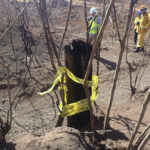The source of some outbreaks of illness could be found much more quickly if an Arkansas company’s new, fast method to test food for pathogens gains widespread use.
The process developed by Little Rock-based Litmus LLC can find out within 15 minutes if food contains contaminants such as E. coli and salmonella, which are the most common causes of food-borne illnesses.
That compares with a two- or three-day waiting period that is now standard for getting results of tests currently in use, according to an executive of the company.
Litmus LLC worked with the federal Food and Drug Administration’s National Center for Toxicological Research at White Hall for two years to develop the Rapid-B test for use by growers, producers and processors in testing food for the bacteria that can cause food-related illnesses.
Ted Moskal, president of Litmus-Rapid-B, a subsidiary of Litmus and the commercial partner for the NCTR, said the standard testing methods for food-borne pathogens are a two-step process. A culture is grown from the food sample and then sent to a laboratory where it is assessed by experts.
“About 48 hours later the results are sent back, and that does not include the time it takes for transportation of the samples,” Moskal said. That time frame can be a significant delay for perishable products like meats and fresh produce.
Rapid-B, however, bypasses the standard culture-growing processes and can identify individual bacteria in about 15 minutes.
Moskal said the products are swabbed with a collection tool, then mixed with agents that reveal the types of pathogens present. The instruments involved do not require a laboratory environment, he said.
“We count the individual bacteria,” Moskal said. “It’s very specific. The biggest thing is that we have no false positives and no false negatives.”
The Centers for Disease Control and Prevention estimates that unsafe foods cause as many as 76 million illnesses in the U.S. annually. Most recently, an E. coli outbreak in spinach killed three people and sickened more than 200, while a salmonella outbreak linked to certain jars of peanut butter caused nearly 300 people to fall ill.
Litmus chief executive Mark Diggs said the new tests will help protect the public from future outbreaks of food-borne pathogens.
“One of the key issues in protecting the public from bacterial outbreaks is being able to quickly and accurately detect bacterial pathogens before they hit the grocery shelves,” he said.
NCTR officials referred calls to Moskal.
Was this article valuable?
Here are more articles you may enjoy.

 Dog-Related Injury Claim Payouts Hit $1.12B in 2023, Report Shows
Dog-Related Injury Claim Payouts Hit $1.12B in 2023, Report Shows  Poll: Consumers OK with AI in P/C Insurance, but Not So Much for Claims and Underwriting
Poll: Consumers OK with AI in P/C Insurance, but Not So Much for Claims and Underwriting  Supreme Court Allows More Transport Workers to Bypass Arbitration and Sue Employers
Supreme Court Allows More Transport Workers to Bypass Arbitration and Sue Employers  Hawaiian Electric Hits 40-Year Low Ahead of Maui Fire Report
Hawaiian Electric Hits 40-Year Low Ahead of Maui Fire Report 